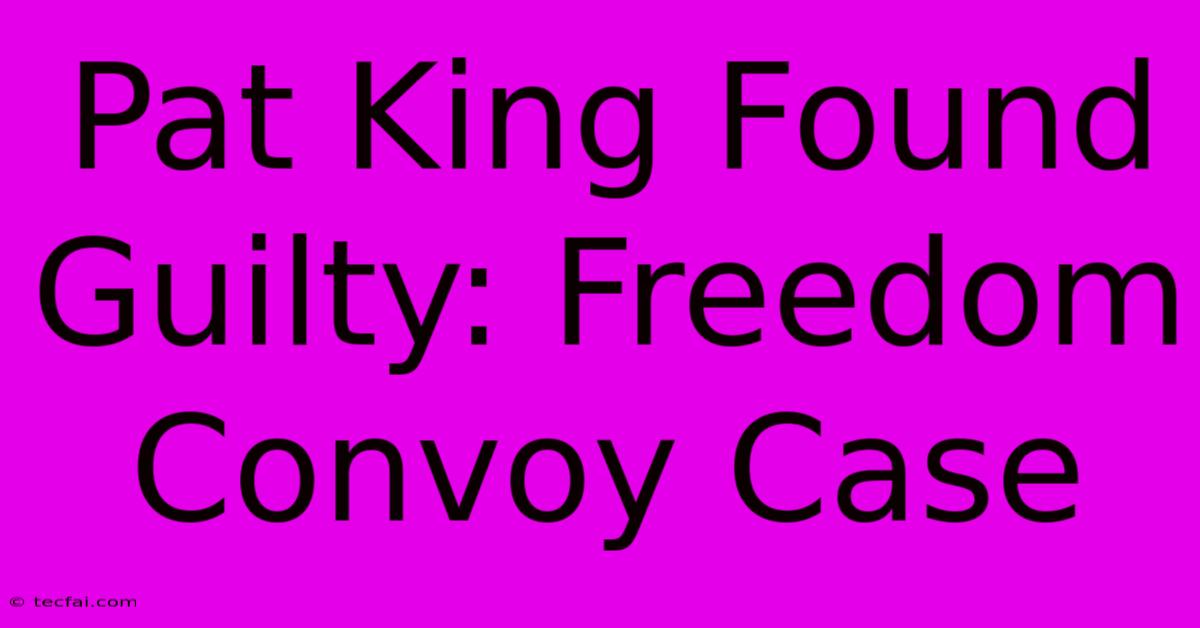Pat King Found Guilty: Freedom Convoy Case

Discover more detailed and exciting information on our website. Click the link below to start your adventure: Visit Best Website tecfai.com. Don't miss out!
Table of Contents
Pat King Found Guilty: Freedom Convoy Case Concludes
The highly publicized Freedom Convoy protests that paralyzed Ottawa in February 2022 have reached a significant conclusion with the conviction of key organizer Pat King. This verdict marks a turning point in the legal battles stemming from the demonstrations and raises important questions about freedom of speech, protest rights, and the limits of civil disobedience.
Understanding the Charges and Verdict
Pat King faced multiple charges related to his involvement in the Freedom Convoy, including mischief, obstructing police, and counselling to commit mischief. The Crown successfully argued that King's actions, including his speeches and organizational efforts, significantly contributed to the illegal occupation of Ottawa's downtown core. The specific details of the evidence presented during the trial, including witness testimonies and social media posts, played a crucial role in the judge's decision. The guilty verdict signifies that the court found sufficient evidence to establish King's culpability in the disruption and unlawful activities associated with the convoy.
The Significance of the Freedom Convoy
The Freedom Convoy protests, initially sparked by COVID-19 vaccine mandates and broader grievances against government policies, drew significant attention both domestically and internationally. While many participants expressed genuine concerns, the prolonged occupation of Ottawa led to widespread disruption, including business closures, strained community relations, and significant economic consequences. The protests became a focal point for debates about the balance between individual freedoms and public order, and the extent to which disruptive protests are acceptable within a democratic society. Analyzing the events through the lens of freedom of speech versus public safety is crucial to understanding the complexities of this case.
Implications of the Guilty Verdict
King's conviction has significant implications for future protests and the legal framework governing demonstrations in Canada. It sets a precedent for holding individuals accountable for their roles in organizing and facilitating disruptive and unlawful protests. This case highlights the importance of understanding the legal boundaries of protest and the potential consequences of exceeding those limits. Legal experts are already analyzing the verdict's implications for future cases involving similar actions.
Freedom of Speech vs. Public Order: A Delicate Balance
The Freedom Convoy case inevitably raises the complex question of balancing freedom of speech and assembly with the maintenance of public order. The right to protest is a fundamental tenet of democracy, but this right is not absolute. The line between legitimate protest and unlawful disruption is often blurred, and this case serves as a stark reminder of the potential consequences of crossing that line. Discussions surrounding the legal framework governing protests and the necessity of clear guidelines are crucial following this verdict. Finding that balance is a challenge that demands careful consideration from both legal and societal perspectives.
Looking Ahead: Further Legal Ramifications
The aftermath of Pat King's conviction will undoubtedly see further legal proceedings related to the Freedom Convoy. Other participants may still face charges, and appeals of existing verdicts are likely. The case will continue to be a subject of debate and analysis among legal scholars, political commentators, and the public at large. It is important to follow the unfolding legal ramifications for a complete understanding of the event's lasting impact.
The Pat King case is more than just a single conviction; it's a landmark event with far-reaching implications for the future of protest and the legal landscape in Canada. The verdict underscores the importance of understanding the limits of freedom of expression and the responsibility individuals bear for their actions during public demonstrations. The ongoing dialogue surrounding this case will shape future discussions on civil liberties and public order in Canada.

Thank you for visiting our website wich cover about Pat King Found Guilty: Freedom Convoy Case. We hope the information provided has been useful to you. Feel free to contact us if you have any questions or need further assistance. See you next time and dont miss to bookmark.
Featured Posts
-
Sunderland Stars Home Burglary Allegation
Nov 23, 2024
-
Alberta Pension Fund Under Harper
Nov 23, 2024
-
Aim Co Restructure Private Market Focus
Nov 23, 2024
-
Bewitching Wicked Stage Production
Nov 23, 2024
-
Bondi And Trumps 2020 Election Lie
Nov 23, 2024
